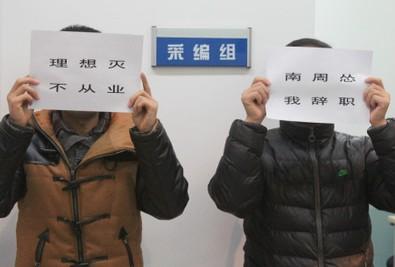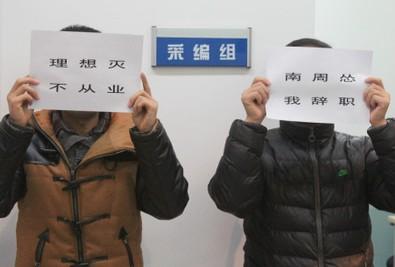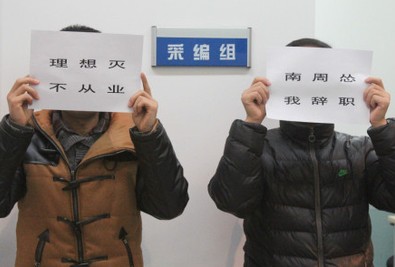Dozens of former editors and reporters of Chinese newspaper Southern Weekly published a letter asking for a Communist Party official to step down after he manipulated the front page of the New Year’s Day edition, making it align more closely with the Party’s propaganda.
In the incident, the Guangzhou-based publication’s New Year special edition was secretly changed at the behest of a government official during the rewriting process. Newspaper reporters complained about the change via their personal blogs and their messages were later removed, but not before other media workers in China took notice.
Luo Changping, an associate editor of Caijing Magazine, disclosed this incident in his blog on Jan. 2, saying that the Southern Weekly was finished and would be sent to be printed, but it was reviewed by the Guangdong Ministry of Propaganda and was changed.
The official in charge of the change was Tuo Zhen, the local minister of propaganda and the former deputy director of Xinhua, one of the Chinese Communist Party’s official mouthpieces.
Apparently, Tuo was upset about the publication’s New Year’s messages and removed content about sensitive issues and changed the theme to praise the Communist Party, which was not included in the original message.
The Southern Weekly’s top reporters were on vacation when Tuo altered the New Year’s message, according to Luo’s blog post. More than 15 reporters at the paper, who were angry with the change, “were gagged,” according to the blog.
Two reporters said they would resign after the incident. “If my dreams are rejected, then I will not work. If Southern Weekly cannot stand up for itself, then I will resign,” reads a slogan that two reporters held on pieces of paper in photographs online.
At the same time, 51 former reporters and editors at the paper released a public letter, calling on Tuo to resign.
Other changes include adding more than 100 characters to the front page news that contained serious factual errors, changing the typesetting of the front page, and deleting mention of “patriots” who took part in an anti-Japan parade.
After making the changes, Tuo then signed the paperwork to print the publication without the paper’s editorial review, even though he had made a number of errors.
The Southern Weekly’s New Year’s editorial is considered an important measurement of sentiment in China’s political climate. The newspaper usually reports on sensitive matters and sometimes tests the Communist Party.
The case underscores the pervasive lack of media freedom and rampant censorship throughout China outside of state-run media, which are subjected to the Communist Party’s meddling on sensitive topics. According to media watchdogs including Freedom House, China is among the worst violators of press freedom in the world.
The Southern Weekly’s editorial statement was supported by a number of Chinese academics and media workers. According to the Wall Street Journal, two-dozen prominent academics signed a similar letter calling to fire Tuo from his position.
“We’re concerned allowing people such as Tuo Zhen to remain in office, and witnessing their ill-doings, will bring about many more negative impacts for the Guangdong provincial party committee,” their letter reads.
Shanghai-based scholar Sun Huaping said he believes the New Year’s edition was rewritten because it included information about the constitution during the end of the Qing Dynasty and the Republic of China.
The original article reads: “Only if constitutionalism is honored and powers checked can citizens loudly voice their criticism of power, and only then can every person believe in their hearts they are free to live. Only then can we build a free and strong country,” according to the Journal.
Beijing-based lawyer Zhou Ze suggested that the Communist Party’s Central Commission for Discipline Inspection should intervene and investigate Tuo for abusing his office.
With research by Jack Phillips.
Read the original Chinese articles 1 and 2.
The Epoch Times publishes in 35 countries and in 20 languages. Subscribe to our e-newsletter.




